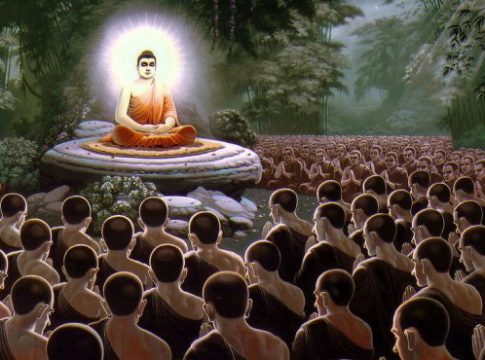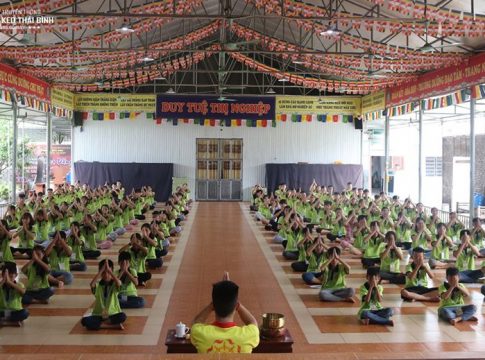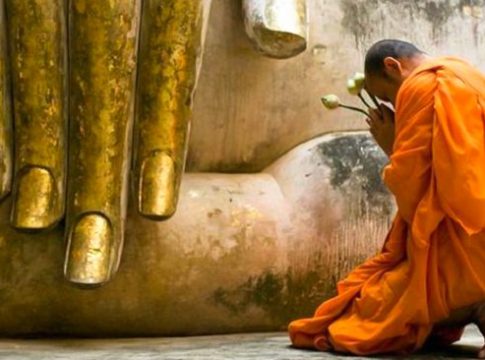Learning Buddhism to Become a Better Person
By Tam Hoa – 10/04/2020
The Buddha’s teachings are infinite, while our understanding, though vast, still has limitations when it comes to application. Learning Buddhism to become a better person is the core issue.
People study Buddhism for different reasons: to become a Buddha, to escape the cycle of birth and death, to return to the Western Paradise, to escape suffering, to transform the body and mind, etc. But ultimately, learning Buddhism to become a good person, useful to family and society, is the most fundamental goal.
The wonder of Buddhism lies in the fact that the Buddha’s teachings are not rigid formulas but are adaptable to each individual’s capacity and circumstances. A suffering person applies the teachings in one way to seek happiness, while someone aspiring to become a Buddha applies them through a different method.
People study Buddhism for different reasons: to become a Buddha, to escape the cycle of birth and death, to return to the Western Paradise, to escape suffering, to transform the body and mind, etc.
Because of this, Buddhism offers 84,000 paths, corresponding to each person's ability and purpose of practice. No matter who you are or what situation you're in, as long as you wish to cultivate goodness, you can easily find a method in the Buddha's teachings to guide you.
Buddhism brings happiness to everyday life through the practice of the Buddha's teachings. However, if one practices incorrectly or is guided in the wrong way, they can easily fall into the suffering of life.
What does it mean to practice Buddhism correctly?
The Buddha once taught: "Serving all beings is the same as offering to the Buddhas". This means that a Buddhist practitioner must apply the teachings to perfect themselves and then help those who are lost or misguided to turn towards goodness. This is the true mission of a genuine practitioner.
Therefore, we should not learn Buddhism to seek purity or holiness that separates us from others, creating a distance between ourselves and others, or distancing Buddhism from reality.
We learn Buddhism to become better people, not to develop feelings of superiority over those less fortunate than ourselves.
Some people, the more they study Buddhism, become stricter in their dealings with others, especially towards those who are misguided or just beginning to study, by imposing their own self-made rules, thinking that they are correct.
But this is wrong. Such actions create barriers for sentient beings and for life itself, especially for those who are superstitious, as it creates an even larger obstacle for them.
In the Vimalakirti Sutra, it is taught: "The more degraded the world becomes, the stronger the vow and determination of the Bodhisattva". This means that true practitioners must make Buddhism more accessible to life, immersing themselves in the world to truly understand and help others. Like a lotus blooming in the mud, they remain pure and beautiful. Only through such practice can one become a meaningful person in life. Buddhism was founded to save those in suffering and to help the wicked become virtuous.
We learn Buddhism to become better people, not to develop feelings of superiority over those less fortunate than ourselves.
The Buddha became great by performing small actions that others avoided. He uplifted U Ba Ly, a man of the lowest caste in society, despised by others, and even converted Angulimala, a murderous and brutal criminal.
As learners of Buddhism and messengers of the Tathagata, we should fulfill this role by bringing Buddhism closer to life and helping alleviate the sorrows and sufferings of others.
We, as Buddhist practitioners, must set this example. We should not discriminate against any sentient beings, whether they are lowly or have committed sins, but instead, we should cultivate greater compassion to help guide them toward goodness. Do not isolate yourself by thinking of yourself as superior; practicing in such a way is meaningless.
The meaning of enlightenment and liberation is not distant but very close to each person's practice. Liberation is freedom from all attachments, finding happiness, and maintaining inner peace in the face of suffering without discouragement or wavering. Studying Buddhism helps us improve by recognizing and avoiding our own mistakes while also contributing more to life. Therefore, a Buddhist practitioner changes both inwardly and outwardly.
Buddhism is wonderful in this way. If we want our children to live morally and be useful to society, we should skillfully teach them the most basic ethical values in the Buddha’s teachings, such as filial piety, gratitude, and compassion. Once they understand these values, they will naturally act in ways that benefit themselves, their families, and society. A community that lives with moral principles is, in essence, a practical "Pure Land on Earth". We should not force them to act righteously if we have not provided them with a solid foundation of morality.
Learning Buddhism to become a better person is essential because the Buddha’s teachings have the power to transform the hearts of people in every circumstance. Therefore, as learners of Buddhism and messengers of the Tathagata, we should fulfill this role by bringing Buddhism closer to life and helping alleviate the sorrows and sufferings of others.
Based on the lecture: "Learning Buddhism to Become a Better Person" – Thich Phuoc Tien
!["[KTMH] Trailer | WHAT TO DO TO MAKE SUMMER HOLIDAYS MORE MEANINGFUL?"](https://i3.ytimg.com/vi/s0VUGa1v6uw/maxresdefault.jpg)
.jpg)


